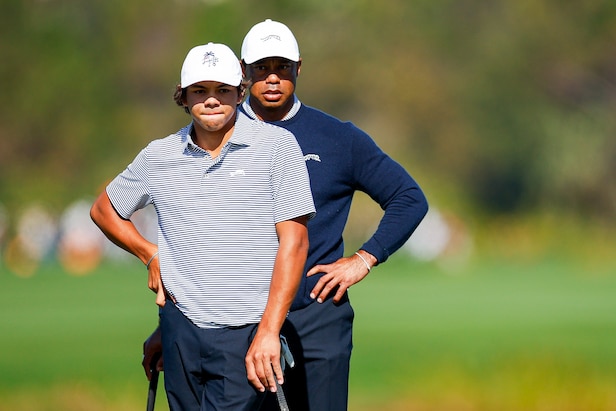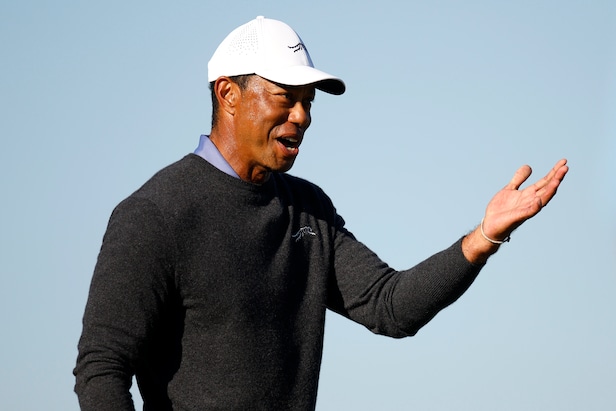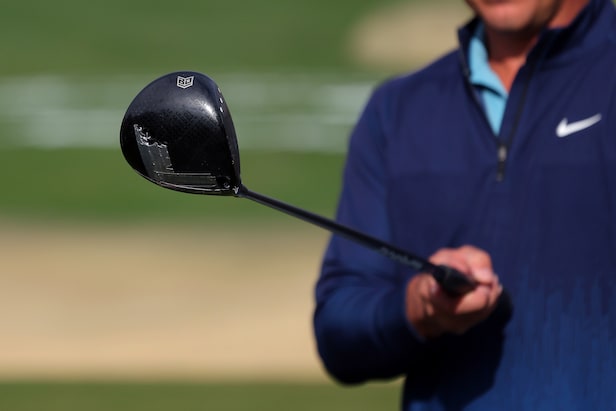PGA Championship 2024: Michael Block on his ‘Year of Blockie’ and what happens when your 15 minutes of fame are up – Australian Golf Digest

- by Admin
- May 8, 2024
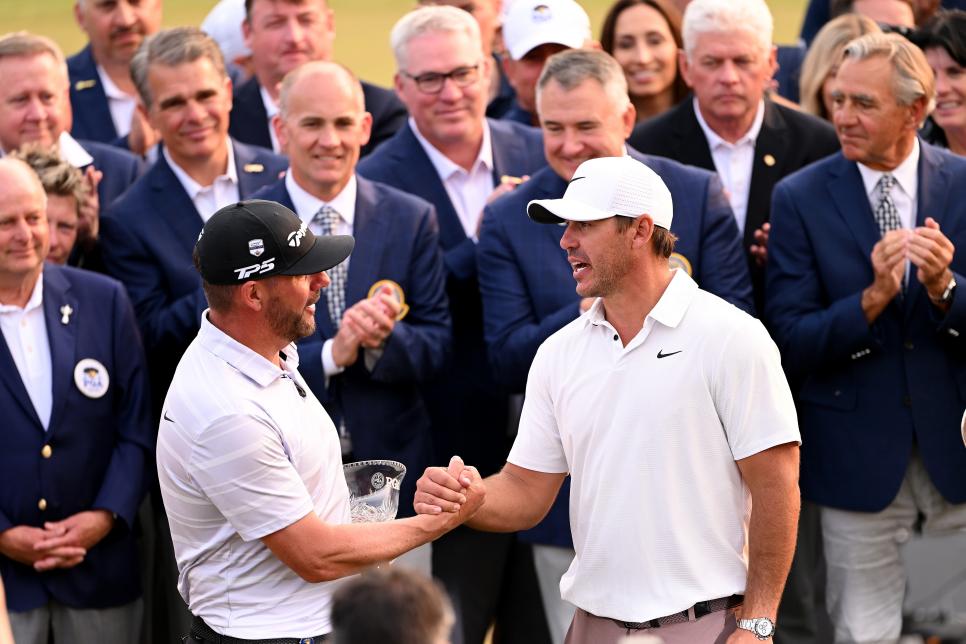
Michael Block has snuck into his office and he reminds himself to shut the door. This is his home, a room tucked away in the ranch-style clubhouse surrounded by the rolling foothills of Southern California. But Block prefers an open entryway so he can keep an eye on the assistants running Arroyo Trabuco Golf Club’s pro shop, to say hello to those checking in and to deliver a good-natured jab to the regulars. Yet Block has to be hidden now, after the “photo requests and autographs and conversations” made it impossible for the staff to get any work done. He’s uncomfortable being sequestered from “my guys,” but the door must remain closed.
That Block is rarely here makes the isolation harder. He rushed back from Frisco, Texas, where he competed at the Club Pro Championship, to be at Arroyo Trabuco’s two-day member-guest. It will be the only two days he’s at the club this month. He’ll get a week of practice and preparation before heading to Louisville for the PGA Championship, followed by a return to Texas for the PGA Tour’s Charles Schwab Challenge at Colonial, which he will play for the second straight season on a sponsor exemption. As Block recounts his itinerary he realizes, with a mix of incredulity and resignation, it’s been a year since he’s given a teaching lesson. Chasing a dream has made home a foreign place.
“It’s been the best year of my life, and I wouldn’t change one thing about it. But it’s very, very strange,” Block says. “To go from a nobody, a husband and father of two, then all of a sudden the golf’s world’s watching every move I make, just the whole thing’s been very odd.”
It was this time last May that Block captivated the golf world, the 46-year-old public course club pro with a friendly demeanor and self-deprecating humor contending at Oak Hill during the 2023 PGA Championship while winning over the crowds in Rochester and those watching from home. On a macro level there was something palliative about Block’s Cinderella success against the backdrop of the prevalent greed, entitlement and self-interest from professional golf’s civil war. In a micro sense, it was endearing to see a man have the time of his life in a moment he thought would never come.
This wonder crescendoed on Sunday, when Block, paired with Rory McIlroy, made a slam-dunk hole-in-one late on the back nine, a shot that left Block seemingly feigning disbelief as the gallery chanted his name. He made a nifty up-and-down for par at the final hole to finish tied for 15th, earning an invite into this year’s PGA.
The “Block Party” was one of the feel-good stories of the year. Then the damndest thing happened. The party continued. Much, much longer than anyone—including Block—could expect.
Michael Block, who was the low PGA professional, is congratulated by 2023 PGA Championship winner Brooks Koepka at Oak Hill.
Ross Kinnaird
Block received two PGA Tour sponsor exemptions in the ensuing three weeks, with one of his rounds at Colonial receiving featured group coverage, and was given an invite into the Australian Open. After failing to qualify for the U.S. Open he was on the grounds of Los Angeles Country Club anyway, promoting Dewar’s Scotch whisky. There were countless other promotional events, including a hole-in-one challenge with Michelob and working a drive-thru shift at Raising Cane’s Chicken Fingers restaurant. He was invited to Tiger Woods’ charity invitational, rubbed shoulders with Brooks Koepka, Max Homa and Bubba Watson. He still competed in his local PGA competitions—including winning the Southern California PGA Professional Championship—but he also became a fixture on the celebrity circuit. The 46-year-old “nobody” was suddenly receiving texts from Michael Jordan and hanging out with Hollywood stars.
“I literally spent a year living a dream, feeling like I just woke up from a dream. I’m like, no, I was just on FaceTime with [actor] Mark Wahlberg sitting next to [rapper] DJ Khaled having lunch in his backyard,” Block says. “And it makes no sense to me. But at the same time I’ve been going with it. One of the things that Khaled told me while sitting in his backyard was, ‘This is your year Blockie and don’t say no to anything.’”
This guiding principle spurred a Block backlash of sorts. Inaccessibility to professional athletes has been a growing problem in sports, yet Block was perhaps too available. He did 30 interviews between Sunday at Oak Hill and a press conference two days later at Colonial, and he’s lost count of how many podcasts, interviews and videos he’s done since. A lot of those platforms aided Block’s popularity, amplifying his story and persona to a public that mostly couldn’t get enough. In that same breath, Block’s willingness to partake in the hagiography of his life could be construed as thirsty. This culture loves celebrities, but it doesn’t want its celebrities to want celebrity.
Provoking that agitation was Block’s response to a podcast host’s question about the biggest difference between his game and Rory McIlroy’s. Block responded, “Oh my God. What I would shoot from where Rory hits it would be stupid. I think I’d be one of the best players in the world. Hands down. If I had that stupid length, all day. My iron game, wedge game, around the greens and my putting is world class.”
Never mind this is exactly the type of conviction needed by any golfer, let alone a club pro contending at a major championship. Block’s words were seen as cavalier and brash, sentiments that while celebrated in other sports are considered cardinal sins in golf.
Not helping was Block’s performance. He finished dead last the week after Oak Hill at the Charles Schwab Challenge and didn’t do much better at the RBC Canadian Open. In fact, of the eight PGA Tour starts Block made the past two seasons, Oak Hill was the only one where he made the cut. Without the game to back his story up, Block went from a scene stealer to side show. The line is thin and the standards are harsh, but that is the reality.
He was enjoying the spoils of his newfound stardom, but Block admits the negative reaction got to him.
“The hate part of it, the social media part got us nasty, man,” Block says. “I’m sure some people talk trash behind my back in my life, but I’m literally seeing people that hate me and I’m going, ‘What in the world did I ever do to this human being?’ I didn’t understand it. That was definitely the toughest part.
“I was trying to defend myself and trying to be like, ‘Hey, you don’t know me.’ I remember I saw someone say, ‘I heard Michael doesn’t treat club pros well.’ Bro, I’m a club pro, what are you talking about? People just hate people just to do it and just to get likes and all this other stuff. So I understand that’s what just kind of comes around with the territory in this world.”
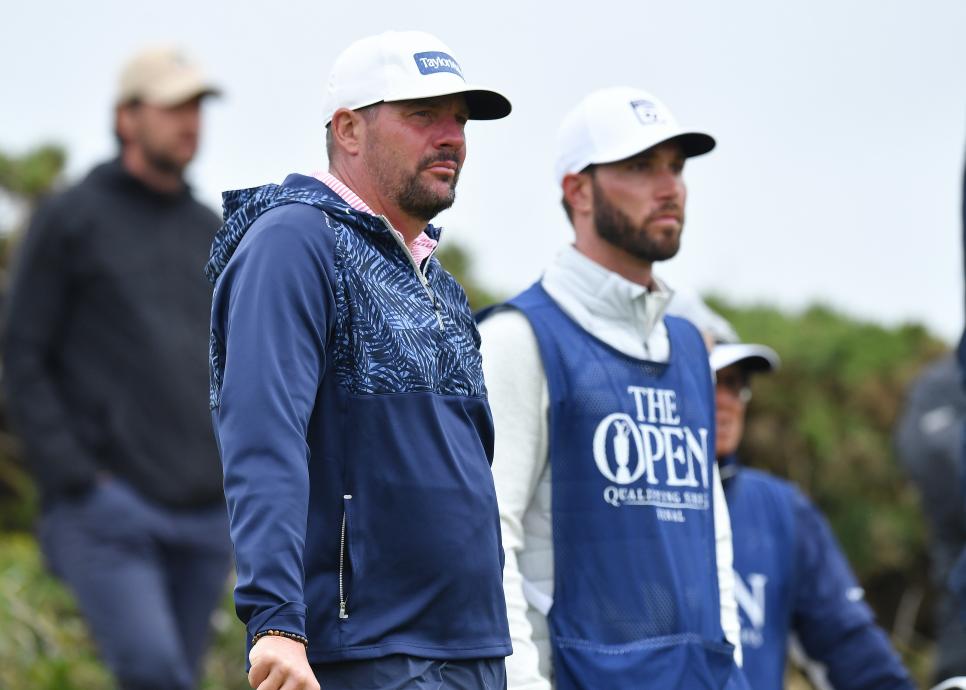
After his PGA Championship performance, Michael Block got numerous opportunities to play in pro events, and tried to qualify for the Open Championship.
Mark Runnacles/R&A
It’s worth remembering how unchartered this territory was for Block. He didn’t become a PGA member until 35 years old, too busy trying to get Arroyo Trabuco off the ground in the early-to-mid Aughts to worry about playing against fellow club pros and the opportunities that come with it. Eventually the Arroyo Trabuco regulars, who played against Block in a Tuesday morning money game, pushed him to get his PGA license to compete, and in his first year he won the PGA’s Professional Championship. Even before Oak Hill, Block had become something of a SoCal PGA legend; he’s won his district’s Player of the Year honor in 10 of the last 11 years. Still, the expanse between who he was to what he had become was wide, and he had to make that tightrope walk where every misstep was now noted.
If Block’s sensitive about the criticism, it’s because he’s a people-pleaser. It’s what got him into the club pro business. He loves being social, and loves that it’s his job to help make others happy. It’s why Block acted like such a showman in Rochester (although, he would like to add, he truly didn’t know he made that hole-in-one with Rory). Fans enjoy when he hams it up, and frankly, he does, too.
“I’ve noticed that I love the crowd,” Block says with a laugh, when answering what he’s learned about himself. “I really do. They really inspire me to hit better shots. I really love making putts, whether it’s for a birdie part or bogey, I don’t care. Just to have the crowd roar and to cheer for me, what a rush.”
And who could blame him? He was a regular guy being treated like royalty, so you’re damn right he was going to say “yes” to every opportunity. That many came with financial benefits didn’t hurt, but in truth, Block says he knew how ridiculous all this was, and also understood it had a shelf life. He didn’t want to view this once-in-a-lifetime stretch with regret.
Block gets that next week the “Year of Blockie” will likely conclude at Valhalla. What happened last spring hasn’t bestowed fantastical aspirations of winning the Wanamaker. Block simply wants to make the cut, and considering he owns a share of the Valhalla course record, he likes his chances. However, the Block Party’s one-year anniversary has allowed him to look through the window of the past. Block says he has watched the highlights from his final round at Oak Hill; when he ultimately returned to California, Escalade gifted him a car to use for the rest of the year (the company had a suite right next to his ace at the 15th), and preloaded on a TV headrest the broadcast from Rochester.
“It was surreal,” Block says. “I’m sitting in an SUV watching myself on television. Like, come on.” He also doesn’t need to watch it again.
“It’s imprinted in my head,” Block says. “I can’t tell you what I did yesterday. But I can tell you every shot, every interaction, every minute of that experience. I still remembering going into the merchandise tent early Saturday and there’s a huge reaction to me being there. Or at night, when me and my friends are having wine and beer and running up the largest bill I’ve ever seen, and some stranger took care of it for us. I remember everything, because I didn’t want it to end.”
The one thing that sticks out the most is a scene that happened across the country from Arroyo Trabuco’s clubhouse, moments after Block made his hole-in-one. That’s where Block’s family was, including his mom and dad and his sons. After the ace, the owner of the course jumped on a table and bought a round for everyone.
“Man, I started crying when I saw that watch party,” Block says. ‘I had no idea that watch party was happening when I played on that Sunday. When I got back, you know, all the servers, the line cooks, everyone in the restaurant was just like, you can tell that they look at me differently now ’cause they’ve seen me on the TV and watching that stuff.”
Now 47, Block never wanted to be staring down a six-footer to pay for his mortgage, and he’s not obtuse to his playing results post-Oak Hill. He’s wary of the road. He wants to be with his family, especially as his sons are becoming serious golfers. He’s looking forward to Valhalla where “I promise to take as many autographs and photos to anyone that asks,” Block says, “and to thank everyone for what they’ve given to me over the past year.”
But he knows who he is and where he belongs. Michael Block wants to be home, preferably with the door open.
This article was originally published on golfdigest.com
The Latest News
-
December 23, 2024Wimbledon champion accepts ban for anti-doping breach just months after winning US Open
-
December 23, 2024Australian tennis star Purcell takes voluntary suspension over anti-doping breach
-
December 23, 2024Max Purcell to miss Australian Open after accepting ban for anti-doping breach
-
December 23, 2024Australian tennis star Purcell provisionally suspended for doping
-
December 23, 2024Star batter misses optional Aussie session; MCG curator rejects anti-India ‘conspiracy’ — Test Daily


